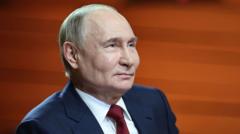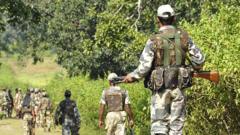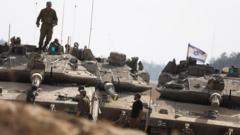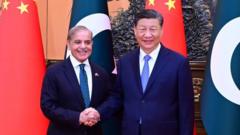**The recent ceasefire comes after days of significant military exchanges ignited by violence in Kashmir.**
**Ceasefire Reached Between India and Pakistan Amidst Intensified Strikes**

**Ceasefire Reached Between India and Pakistan Amidst Intensified Strikes**
**Both nations agree to halt military actions following US mediation, despite ongoing tensions.**
India and Pakistan have announced a ceasefire following four days of heightened military strikes across their disputed border region, primarily affecting Kashmir. The agreement was reportedly facilitated by US President Donald Trump via social media, who stated that a "full and immediate ceasefire" had been achieved after US mediation efforts. Despite this announcement, reports from residents and reporters in Indian-administered Kashmir, particularly in cities like Srinagar and Jammu, indicated that explosions were still being heard, leading many to question the immediate effectiveness of the ceasefire.
In the days leading to the ceasefire, there was a surge of missile and drone strikes initiated by India in response to the tragic deaths of Indian citizens, attributed to militants in Kashmir. Pakistan has firmly denied any connection to those attacks. The region of Kashmir has long been a contentious spot between the two nuclear-armed neighbors since the partition of India and Pakistan in 1947, leading to numerous conflicts over territorial claims.
India's External Affairs Minister S Jaishankar emphasized the nation's unyielding stance against terrorism, asserting that the country would not waver in its fight against the threat. Meanwhile, Pakistan's Deputy Prime Minister Ishaq Dar reiterated the country's commitment to regional peace while maintaining its sovereignty. Following the announcement of the ceasefire, the international community, including China and G7 nations, urged both countries to prioritize peace and stability.
U.S. Secretary of State Marco Rubio indicated that both India and Pakistan have agreed to engage in talks regarding a range of issues in a neutral location. Notably, U.N. Secretary-General Antonio Guterres expressed his approval of all efforts aimed at de-escalating the tensions. UK Prime Minister Sir Keir Starmer confirmed that Britain had also been involved in discussions, underscoring the need for a lasting resolution to the conflict.
The escalation of hostilities came on the heels of a violent attack in Indian-administered Kashmir that resulted in the deaths of 26 tourists. Survivors of the assault described a targeted violence against specific groups, heightening anxieties in a region constantly fraught with conflict. The Indian Defense Ministry characterized their response actions as a necessary measure to hold accountable those responsible for the attacks, while Pakistan condemned these strikes as unprovoked aggression.
As both nations report casualties from the mutual hostilities, with Pakistan claiming 36 deaths and India citing 21 civilian deaths due to cross-border fire, the situation remains precarious. Accusations of targeting military sites and airbases have intensified skirmishes, leading to calls for reconciliation amidst fears of a wider escalation of violence.
In the days leading to the ceasefire, there was a surge of missile and drone strikes initiated by India in response to the tragic deaths of Indian citizens, attributed to militants in Kashmir. Pakistan has firmly denied any connection to those attacks. The region of Kashmir has long been a contentious spot between the two nuclear-armed neighbors since the partition of India and Pakistan in 1947, leading to numerous conflicts over territorial claims.
India's External Affairs Minister S Jaishankar emphasized the nation's unyielding stance against terrorism, asserting that the country would not waver in its fight against the threat. Meanwhile, Pakistan's Deputy Prime Minister Ishaq Dar reiterated the country's commitment to regional peace while maintaining its sovereignty. Following the announcement of the ceasefire, the international community, including China and G7 nations, urged both countries to prioritize peace and stability.
U.S. Secretary of State Marco Rubio indicated that both India and Pakistan have agreed to engage in talks regarding a range of issues in a neutral location. Notably, U.N. Secretary-General Antonio Guterres expressed his approval of all efforts aimed at de-escalating the tensions. UK Prime Minister Sir Keir Starmer confirmed that Britain had also been involved in discussions, underscoring the need for a lasting resolution to the conflict.
The escalation of hostilities came on the heels of a violent attack in Indian-administered Kashmir that resulted in the deaths of 26 tourists. Survivors of the assault described a targeted violence against specific groups, heightening anxieties in a region constantly fraught with conflict. The Indian Defense Ministry characterized their response actions as a necessary measure to hold accountable those responsible for the attacks, while Pakistan condemned these strikes as unprovoked aggression.
As both nations report casualties from the mutual hostilities, with Pakistan claiming 36 deaths and India citing 21 civilian deaths due to cross-border fire, the situation remains precarious. Accusations of targeting military sites and airbases have intensified skirmishes, leading to calls for reconciliation amidst fears of a wider escalation of violence.




















